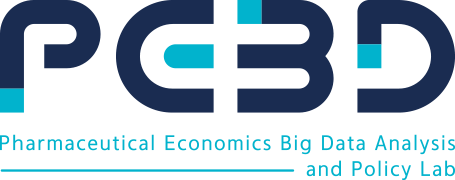INTRODUCTION
Pharmaceutical Economics,Big Data Analysis & Policy Lab
Research Overview
-
 Pharmacoeconomics
PharmacoeconomicsPharmacoeconomics has been defined as the description and analysis of the costs of drug therapy to health care systems and society. It identifies, measures, and compares the costs and consequences of pharmaceutical products and services. Clinicians and other decision makers can use these methods to evaluate and compare the total costs of treatment options and the outcomes associated with these options.
-
 Big Data Analysis
Big Data AnalysisThere is an abundance of health data in South Korea that allows researchers to explore healthcare resource utilization, costs, and clinical outcomes of the population of interest. The data sources that we focus on include National Health Insurance data, Common Data Model (CDM), and National Health Survey data. By leveraging cutting-edge methodologies, including artificial intelligence/machine intelligence (AI/ML), we analyze and interpret this data to measure and value a wide range of healthcare outcomes. Using common data models, we can create a standardized framework for analyzing healthcare data, enabling efficient analysis and sharing of methods and results across different institutions and systems. Our research aims to inform the movement toward evidence-based healthcare by providing valuable insights into healthcare delivery and improving the quality of patient care.
-
 Outcomes Research & Pharmacoepidemiology
Outcomes Research & PharmacoepidemiologyOutcomes research seeks to understand the end results of particular health care practices and interventions. End results include effects that people experience and care about, such as change in the ability to function. In particular, for individuals with chronic conditions—where cure is not always possible—end results include quality of life as well as mortality. By linking the care people get to the outcomes they experience, outcomes research has become the key to developing better ways to monitor and improve the quality of care.
Pharmacoepidemiology is the study of the utilization and effects of drugs in large numbers of people; it provides an estimate of the probability of beneficial effects of a drug in a population and the probability of adverse effects. It can be called a bridge science spanning both clinical pharmacology and epidemiology. Pharmacoepidemiology concentrates on clinical patient outcomes from therapeutics by using methods of clinical epidemiology and applying them to understanding the determinants of beneficial and adverse drug effects, effects of genetic variation on drug effect, duration-response relationships, clinical effects of drug-drug interactions, and the effects of medication non-adherence.
-
 Health Policy
Health PolicyHealth policy research is an interdisciplinary field that embraces the development, implementation, and evaluation of health policies to address a wide variety of challenges throughout the health systems and services. We have been working with South Korean government agencies to provide evidence-based insights for policymakers in decision making.
